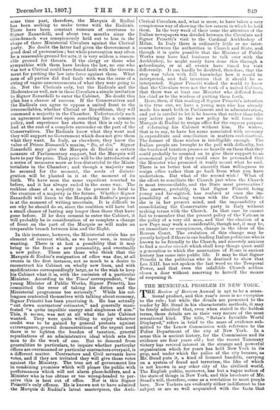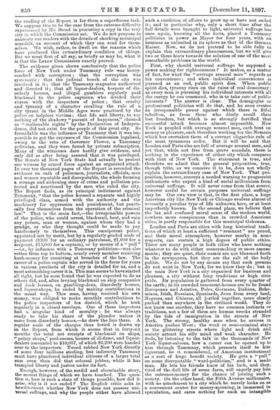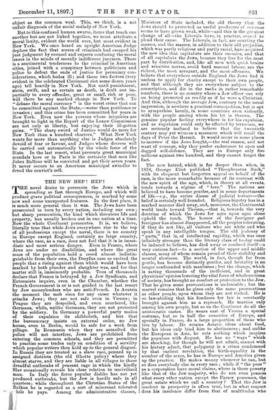THEMUNICIPAL PROBLEM IN NEW YORK. T HE Review of Reviews Annual
is apt to be a sensa- tional product, and this year's issue is no exception to the rule ; but while the details are presented to the reader by Mr. Stead in his characteristic methods, it may be freely admitted that, even when stated in the baldest terms, those details are in their very nature of the most sensational kind. The title, " Satan's Invisible World Displayed," refers in brief to the mass of evidence sub- mitted to the Lexow Commission with reference to the Police Department of the city of New York. In a sense this is ancient history, for the Commission and its evidence are four years old ; but the recent Tammany victory has revived interest in the strange and powerful organisation which for years has held New York in its grip, and under which the police of the city became, as Mr. Stead puts it, a kind of licensed banditti, carrying on a system of fraud and terrorism, the like of which is not known in any other city of the civilised world. The English public, moreover, has but a vague notion of the state of things in New York, and this brochure of Mr. Stead's will, therefore, come as a revelation to most people here. New Yorkers are evidently either indifferent to the subject or are so well acquainted with the facts that the reading of the Report is for them a superfluous task. We suppose this to be the case from the extreme difficulty experienced by Mr. Stead in procuring a copy in the very city in which the Commission sat. We do not propose to nauseate our readers with the details of shocking municipal scandals, an account of which they can read for them- selves. We wish, rather, to dwell on the reasons which have produced this extraordinary condition of things. But we must first of all say, as briefly as may be, what it is that the Lexow Commission exactly proved.
The evidence given shows conclusively that the police force of New York under Tammany rule was honey- combed with corruption ; that the corruption was systematic ; that the judicial bench of the city was involved in it ; that the Tammany magnates authorised and directed it; that all liquor-dealers, keepers of dis- orderly houses, and illegal gamblers regularly paid blackmail to the police captains, who divided their shares with the inspectors of police ; that cruelty and tyranny of a character recalling the rule of a city tyrant in the Middle Ages were practised by the police on helpless victims ; that life and liberty, to say nothing of the shadowy "pursuit of happiness," claimed as " inalienable rights " by the Declaration of Indepen- dence, did not exist for the people of this great city. So formidable was the influence of Tammany that it was im- possible to get the expenses of the Commission legalised, owing to the veto of Governor Flower, a Tammany politician, and they were found by private subscription. Many of the witnesses dare hardly give evidence, and only did so after being assured that it was privileged. The Senate of New York State had actually to protect one witness by armed force against an organised attack. In over ten thousand pages of the Report is recorded the evidence on oath of policemen, journalists, officials, men and women reputable and disreputable, the whole forming a strange and sickening story of crime and pollution pro- tected and sanctioned by the men who ruled the city. The Report finds, as its principal indictment against Tammany, "that the police formed a separate and highly privileged class, armed with the authority and the machinery for oppression and punishment, but practi- cally free themselves from the operation of the criminal law." That is the main fact,—the irresponsible powers of the police, who could arrest, blackmail, beat, and ruin any person, man or woman, against whom they had a grudge, or who they thought could be made to pay handsomely to themselves. This omnipotent police, appointed not by merit, but by a regularly graded scale of payment ($300 for an ordinary patrolman, $1,600 for a sergeant, $15,000 for a captain), or by means of a " pull " —i.e., by influence with a Tammany politician—was also rotten from top to bottom, nearly every member receiving hush-money for conniving at breaches of the law. The career of a police captain who served in the force for years in various precincts of the city is detailed for us, and a most astonishing career it is. This man seems to have started all right, but he soon found that he was expected to do as others did, and, after levying blackmail on ship companies and dock lessees, on gambling-dens, disorderly houses, and liquor-shops, he ended by making contributions in the usual way. This man, having received his own money, was obliged to make monthly contributions to the police inspeetors of his district, which he took regularly in a closed envelope. One of these inspectors bad a singular kind of morality : he was always ready to take his share of the plunder unless it came from disorderly houses,—he drew the line there. A -regular scale of the charges thus levied is drawn up in the Report, from which it seems that in forty-six months the total net receipts of blackmail on ships, , " policy shops," pool-rooms, houses of ill-fame, and liquor- dealers amounted to $10,657, of which $3,200 were handed over to the inspectors. Tweed robbed New York directly of some four millions sterling, but indirectly Tammany must have plundered individual citizens of a larger total sum even than did that colossal jobber, while it has trampled liberty and justice under its feet.
Enough, however, of the sordid and abominable story, the merest fringe of which we have touched. The ques- tion is, how is such a state of things possible, how did it arise, why is it not ended ? The English critic asks in bewilderment whether New York does not possess uni- versal-suffrage, and why the people either have allowed. such a condition of affairs to grow up or have not ended it; and in particular why, only a short time after the full details were brought to light, universal suffrage has once again, knowing all the facts, placed a Tammany politician in power as Mayor for four years, with an nominee as unlimited in its sphere as that of the German Kaiser. Now, we do not pretend, to be able fully to explain this extraordinary phenomenon, but we will give two or three hints towards the solution of one of the most remarkable problems in the world, First, why should universal suffrage be supposed a power making for righteousness ? It makes, as a matter of fact, for what the "average sensual man" regards as his convenience ; and when individual convenience is pursued as an end, public spirit dies. When public spirit dies, tyranny rises on the ruins of real democracy; as every man is pursuing his individual interests with all the energy he can command, who is to take care of public interests ? The answer is clear. The demagogue or professional politician will do that, and he soon creates an irresponsible power against which there is fitful rebellion, as from those who dimly recall their lost freedom, but which is so strongly fortified that successful attack becomes almost impossible. New York is peopled with average sensual men, each bent on money or pleasure, each therefore working for the Nemesis which has overtaken them of a corrupt oligarchic rule of the most tyrannous order. But it will be said that London and Paris also are full of average sensual men, and yet that, while not free from grave scandals, there is nothing in the experience of either city which compares with that of New York. The statement is true, and therefore we admit that the general proposition, true, though trite, as we conceive it to be, does not wholly explain the extraordinary case of New York. That pro- position, however, conveys a needed warning to progressist enthusiasts who expect a kind of social millennium from universal suffrage. It will never come from that source, however useful for certain purposes universal suffrage may be. Our own view is that, in the first place, a huge American city like New York or Chicago evolves almost of necessity a peculiar type of life unknown here, or at least imperfectly known. In the second place, we believe that the lax and confused moral sense of the modern world, nowhere more conspicuous than in crowded American cities, is partly responsible for this municipal Gehenna.
London and Paris are cities with long historical tradi- tions of which at least a sufficient " remnant " are proud, and their moral atmosphere, however murky in some respects, can sustain a high degree of public ethics. There are many people in both cities who have nothing whatever to do with either moneymaking or mere amuse- ments; they are quiet, their names are not blazoned forth in the newspapers, but they are the salt of the body politic. We do not by any means say that such persons do not exist in New York, for we know they do ; but in the main New York is a city organised for business and pleasure, a city without long traditions or high civic pride. Its population is gathered from every quarter of the earth ; in its crowded. tenement-houses are to be found Europeans and Asiatics, Poles, Germans, Italians, Bohe- mians, Irish, Russians, Spaniards, Jews from every land, Negroes, and Chinese, all jostled together, more closely packed than anywhere in the civilised world. They do not know one another, they have no common instincts or traditions, not a few of them are human wrecks stranded by the tide of immigration in the streets of New York. The strong, healthy man when he arrives in America pushes West ; the weak or semi-criminal stays in the glittering streets where light and drink and society attract his silly mind and weak character. He finds, by listening to the talk in the thousands of New York liquor-saloons, how a career can be opened up to him through Tammany, which presents itself to him (ignorant, be it remembered, of American institutions) as a sort of huge benefit society. He gets a " pull " on some disreputable " ward-politician," and is a made man. He lets his friends know of his luck, and they, tired of the dull life of some farm, will eagerly pay him the entrance-money for the chance of joining such a society. On the, other hand, the Fifth Avenue millionaire, with no attachment to a city which he merely looks on as a convenient centre for money-spinning, is immersed in speculation, and cares nothing for such an intangible object as the common weal. This, we think, is a not unfair diagnosis of the social malady of New York.
But to this confused human swarm, items that touch one another but are not linked together, we must attribute a moral laxity, evident the world over, but most evident in New York. We once heard an upright American Judge deplore the fact that scores of criminals had escaped his just judgment by counsel and experts confusing the moral issues in the minds of morally indifferent jurymen. There is a sentimental tenderness to the criminal in American cities, joined with a conspiracy between politicians and police to defeat the ends of justice for pecuniary con- siderations, which bodes ill ; and these two factors (very evident in the celebrated Cincinnati riot some dozen years ago) tell heavily in New York. Not until punishment, stern, swift, and as certain as death, is dealt out im- partially to every offender, great or small, rich or poor, will there be any marked change in New York. To "debase the moral currency" is the worst crime that can be committed against the State,—worse than pestilence or invasion ; and this crime has been committed for years in New York. Even now the persons whose iniquities are brought to light in the Report of the Lexow Commission are not only at liberty, but enjoying their ill-gotten gains. " The sharp sword of Justice would do more for New York than a hundred charters." What New York wants far more than anything else is Judges absolutely devoid of fear or favour, and Judges whose decrees will be carried out automatically by the whole force of the State. In the last resort, what prevents great municipal scandals here or in Paris is the certainty that men like Jabez Balfour will be convicted and get their seven years. It never occurs to an American municipal swindler to dread the convict's cell.












































 Previous page
Previous page